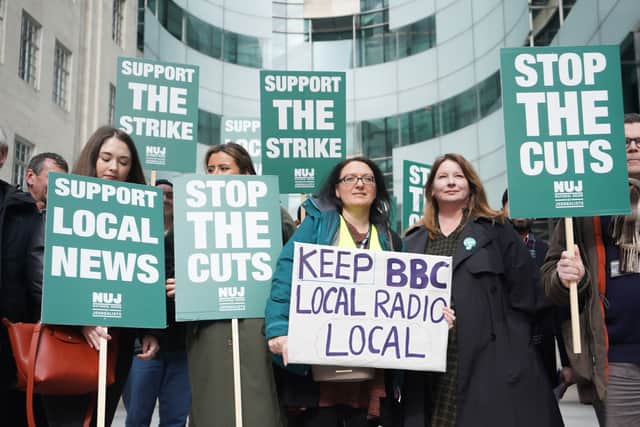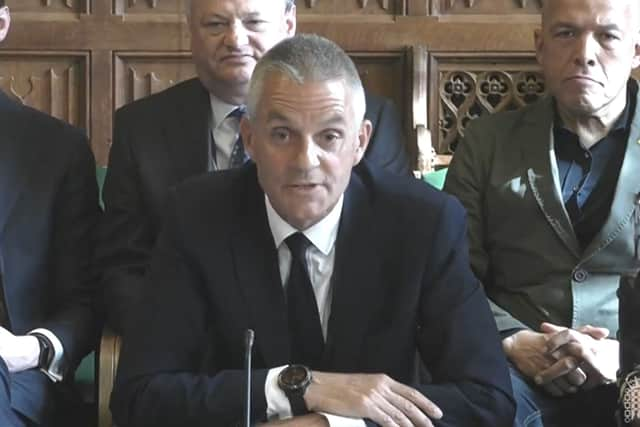BBC local radio cuts: MPs tell Tim Davie rehiring process amounts to ‘workplace bullying’
and live on Freeview channel 276
MPs have accused the BBC of “workplace bullying” as the corporation’s Director-General was challenged on cuts to local radio.
A House of Commons committee asked Tim Davie why presenters fighting to keep their jobs were asked by managers to sell themselves in 60 seconds as part of the recruitment process. Davie said there were valid ‘cultural concerns’ but insisted the process had been fair.
What cuts are being made?
Advertisement
Hide AdAdvertisement
Hide AdCuts to BBC local radio were first announced in October last year. Under the plans, £19 million of funding will be moved to online and multimedia content so a wider range of people can access BBC output relevant to their area.
As a result, around half of the BBC’s 39 local stations will start sharing an afternoon drivetime programme in the week, while regional late-night shows will be replaced with one programme broadcast across England. The changes are due to be implemented in the coming months.


Staff, unions and charities have raised serious concerns about the impact on older and disabled listeners, while members of the National Union of Journalists (NUJ) - who recently passed a vote of no confidence in the corporation’s senior leadership team - went on strike for 48 hours last week in protest.
Meanwhile more than 50 MPs have written a series of cross-party letters to Tim Davie asking him to reconsider the cuts. He was questioned about them by the Commons Culture, Media and Sport Committee on Tuesday (13 June).
What did Tim Davie say?
Advertisement
Hide AdAdvertisement
Hide AdDavie admitted the cuts were “unpopular” but strongly denied suggestions that the BBC was deliberately putting local radio into “managed decline” so it could be switched off at a later date. He said he was “utterly committed” to growing the BBC’s local offering “for the long term” which is why more money was being invested in digital services. He added that “most 65-to-75-year-olds” now got their news online.
NationalWorld has previously reported on concerns about the way the cuts process has been managed. Existing presenters, some with decades of on-air experience, were required to reapply for their jobs by submitting demo reels and - in interviews - were told to sell themselves in 60 seconds. Some said they’d seen an impact on their mental health, while others told NationalWorld that managers had treated employees with “arrogance and disregard”.


Addressing Davie, Conservative MP Steve Brine said this amounted to “workplace bullying”. Davie responded: “I think what the team have tried to is get a process that is fair to everyone and level the playing field. When I was interviewed for Director General, I was given a chance to do a pitch and I did my work. The management are trying to be fair. Is it pleasant to go through? No.”
What other concerns have been raised?
NationalWorld revealed last month that - despite BBC denials - employees were told their redundancy payments could be withdrawn if they spoke publicly about the changes. We also reported on criticism of remarks made by one executive, Rhodri Talfan-Davies, who suggested the BBC’s online service was more “professional” than its local radio offering. He later tweeted that his comments had been misrepresented.
What has the BBC said?
Advertisement
Hide AdAdvertisement
Hide AdIn a statement, a BBC spokesperson said: “We understand this is a difficult period of change for many colleagues and we will continue to support everyone affected by the plans to strengthen our local online services across news and audio”.
“Our goal is to deliver a local service across TV, radio and online that offers more value to more people in more local communities. While the plans do impact on individual roles, we are maintaining our overall investment in local services and expect our overall level of editorial staffing across England to remain unchanged”.
Comment Guidelines
National World encourages reader discussion on our stories. User feedback, insights and back-and-forth exchanges add a rich layer of context to reporting. Please review our Community Guidelines before commenting.
